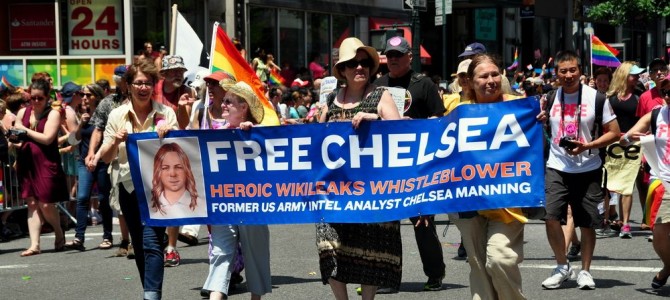Chelsea Manning—who became a male-to-female transgender after going to prison as Bradley Manning for giving reams of classified information to WikiLeaks—allegedly attempted suicide earlier this week. Manning was taken to a prison hospital after an apparent attempted hanging.
This is not a surprise: “transgender” individuals have an alarmingly high suicide rate, somewhere north of 40 percent by some reliable estimates. A variety of explanations are often given for this astronomical figure, chief among them that transgender people are driven to kill themselves in such large numbers because they suffer from discrimination, bigotry and hatred.
Zack Ford of ThinkProgress blames the high suicide rate on “rejection, discrimination, violence, harassment, and the negative life circumstances that result from such treatment.” Last month the New England Journal of Medicine attributed to “substantial discrimination” a great many negative psychological conditions among transgender individuals, including a higher suicide rate.
The Comparatively Low Black Suicide Rate
There are two problems with this theory. The first is that it utterly ignores the most salient feature of transgender individuals: that they are mentally ill and need serious treatment. This is not a moral or ethical judgment. It is, rather, a fact. Individuals who believe they are a different sex than that of their biology are psychologically ill—self-evidently so—and one would quite reasonably expect a higher suicide rate from a portion of the population that suffers from so significant a mental illness (particularly a mental illness it is fashionable to indulge rather than treat).
The second problem is that the discrimination theory of suicide does not hold up when compared to other minority groups who suffer disproportionate real and perceived amounts of bigotry and negative discrimination. The Centers for Disease Control’s numbers on suicide indicate that the highest rates of suicide over the past 15 years or so belong to…white people. In contrast, in most of the years surveyed black people had the lowest suicide rate among all ethnicities. White suicide actually rose in the period 2000-2014.
If discrimination were truly a motivating factor for suicide, you would expect the black suicide rate to be a good deal higher than it is, if not higher outright than the white rate: blacks report overwhelmingly higher rates of perceived racial discrimination than whites, and it is reasonable to assume that actual instances of discrimination against blacks are a good deal higher than those against whites. Yet the suicide rate of the former remains stubbornly lower than that of the latter.
It’s the Mental Illness, Y’all
Why? Because discrimination is almost certainly a nondeterminate factor in general suicide rates. Mental illness, on the other hand, is very clearly a motivating factor in a great many suicides: the rate of successful suicide is extremely correlative with conditions of mental illness. Since transgenderism is a deleterious psychological affliction, it is wholly unsurprising to find higher rates of suicide among that class of people.
A sane society would be advocating for robust, ameliorative psychological therapy to steer transgender people away from their delusions. Instead, we indulge this sickness on an industrial scale, building television shows around the phenomenon and promoting it even unto the point of gross caricature.
Transgender individuals are precious, irreplaceable children of God. They deserve better than the cultural zeitgeist that has decided a sky-high suicide rate is an acceptable externality of modern-day progressive sexual ideology. Unfortunately, as Manning shows, the feel-good politics of liberals often takes precedence over the lives of the vulnerable.








